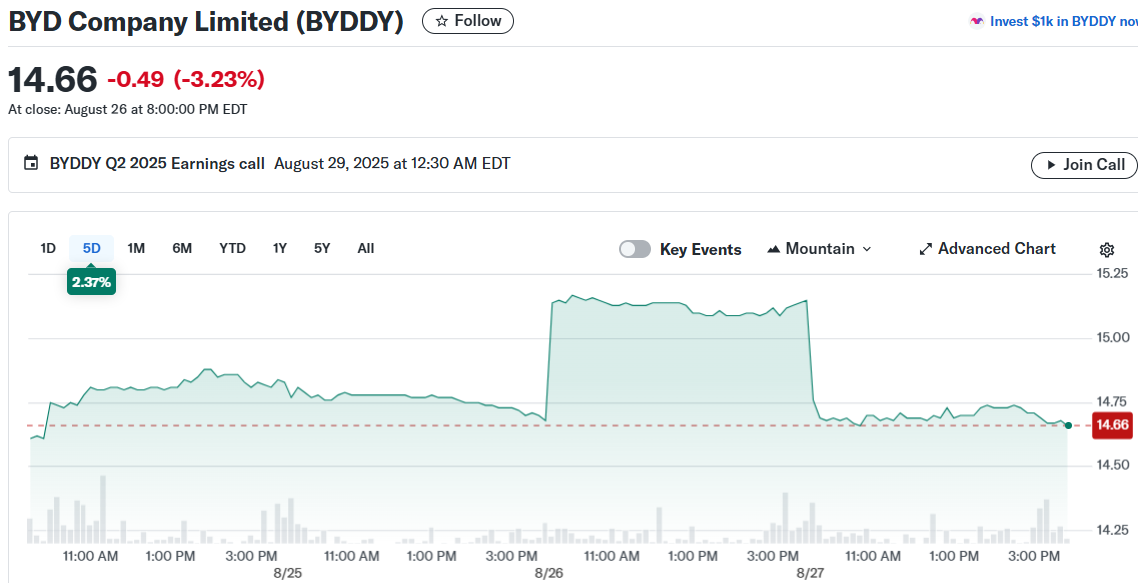TLDR
- BYD tripled European vehicle registrations to 13,503 units in July while Tesla dropped 42% to 6,600 units
- Chinese automaker targets 50% international sales by 2030, investing $500 million in private cargo ship fleet
- Company pivoted to plug-in hybrids and Turkish manufacturing to navigate EU tariffs
- BYD stock trades at $15 per share despite outpacing Tesla in key European markets
- Global EV demand surged 39% in EU and doubled in Brazil during first half of 2025
BYD Company is reshaping the global electric vehicle landscape with aggressive expansion plans and strategic investments. The Chinese automaker set a bold target to sell half its vehicles outside China by 2030, backed by substantial infrastructure investments.

July 2025 sales data reveals BYD’s European momentum. The company registered 13,503 vehicles across Europe, including the UK and associated countries. This represents more than triple the registrations from July 2024.
Tesla faced opposite results in the same market. European registrations fell over 42% to 6,600 vehicles in July. This marks another month of decline for the American EV maker in the competitive European market.
Building Independent Global Infrastructure
BYD’s most striking move involves building its own cargo ship fleet. The company invested approximately $500 million in four vessels, with three additional ships planned. This private fleet will deliver vehicles to Europe and South America.
Most automakers rely on third-party shipping companies and face costly delays. BYD’s approach eliminates middleman fees and provides shipping schedule control. The investment demonstrates serious commitment to international expansion.
The company maintains traditional shipping contracts while building its independent fleet. This dual strategy provides flexibility during the transition period.
BYD adapted quickly to European trade challenges. When the EU imposed higher tariffs on China-built EVs, the company shifted to shipping plug-in hybrids instead. This strategic pivot maintained European market access.
Manufacturing operations also evolved strategically. BYD focused more resources on Turkish facilities where costs are lower and trade rules more favorable. The company slowed Hungarian expansion plans as part of this realignment.
Market Conditions Support Growth
Global EV demand continues expanding across key regions. South American sales nearly doubled in Brazil during the first half of 2025, making it the fastest-growing regional market.
European markets showed strong appetite for electric vehicles. Overall EU battery-electric vehicle sales rose 39% in July. Western Europe achieved record-breaking EV registrations driven by improved charging infrastructure and affordable models.
Asian markets demonstrated similar growth patterns. EV sales jumped over 40% in 2024 compared to 2023 as consumers adopted budget-friendly options.
Recent Performance and Challenges
BYD experienced its first production decline in over a year during July. Vehicle production fell 0.9% year-over-year, ending a 16-month growth streak. Monthly sales still increased 0.6% from June to July.
The company builds value-priced electric vehicles that undercut traditional automakers while maintaining modern features. BYD vehicles appeal to cost-conscious consumers in growing EV markets.
Trade tensions present ongoing challenges. The company halted Mexican factory plans due to U.S. trade policy concerns. European and North American tariff issues require continued strategic navigation.
BYD stock currently trades at $15 per share. This valuation appears attractive compared to Tesla’s premium pricing, especially given BYD’s rapid European growth and global expansion infrastructure investments.





